Fleurs du Mal Magazine


Or see the index
The Romancers
It was autumn in London, that blessed season between the harshness of winter and the insincerities of summer; a trustful season when one buys bulbs and sees to the registration of one’s vote, believing perpetually in spring and a change of Government.
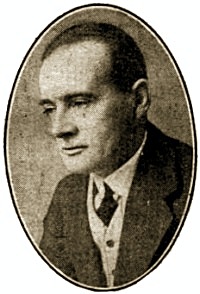 Morton Crosby sat on a bench in a secluded corner of Hyde Park, lazily enjoying a cigarette and watching the slow grazing promenade of a pair of snow-geese, the male looking rather like an albino edition of the russet-hued female. Out of the corner of his eye Crosby also noted with some interest the hesitating hoverings of a human figure, which had passed and repassed his seat two or three times at shortening intervals, like a wary crow about to alight near some possibly edible morsel. Inevitably the figure came to an anchorage on the bench, within easy talking distance of its original occupant. The uncared-for clothes, the aggressive, grizzled beard, and the furtive, evasive eye of the new-comer bespoke the professional cadger, the man who would undergo hours of humiliating tale-spinning and rebuff rather than adventure on half a day’s decent work.
Morton Crosby sat on a bench in a secluded corner of Hyde Park, lazily enjoying a cigarette and watching the slow grazing promenade of a pair of snow-geese, the male looking rather like an albino edition of the russet-hued female. Out of the corner of his eye Crosby also noted with some interest the hesitating hoverings of a human figure, which had passed and repassed his seat two or three times at shortening intervals, like a wary crow about to alight near some possibly edible morsel. Inevitably the figure came to an anchorage on the bench, within easy talking distance of its original occupant. The uncared-for clothes, the aggressive, grizzled beard, and the furtive, evasive eye of the new-comer bespoke the professional cadger, the man who would undergo hours of humiliating tale-spinning and rebuff rather than adventure on half a day’s decent work.
For a while the new-comer fixed his eyes straight in front of him in a strenuous, unseeing gaze; then his voice broke out with the insinuating inflection of one who has a story to retail well worth any loiterer’s while to listen to.
“It’s a strange world,” he said.
As the statement met with no response he altered it to the form of a question.
“I daresay you’ve found it to be a strange world, mister?”
“As far as I am concerned,” said Crosby, “the strangeness has worn off in the course of thirty-six years.”
“Ah,” said the greybeard, “I could tell you things that you’d hardly believe. Marvellous things that have really happened to me.”
“Nowadays there is no demand for marvellous things that have really happened,” said Crosby discouragingly; “the professional writers of fiction turn these things out so much better. For instance, my neighbours tell me wonderful, incredible things that their Aberdeens and chows and borzois have done; I never listen to them. On the other hand, I have read ‘The Hound of the Baskervilles’ three times.”
The greybeard moved uneasily in his seat; then he opened up new country.
“I take it that you are a professing Christian,” he observed.
“I am a prominent and I think I may say an influential member of the Mussulman community of Eastern Persia,” said Crosby, making an excursion himself into the realms of fiction.
The greybeard was obviously disconcerted at this new check to introductory conversation, but the defeat was only momentary.
“Persia. I should never have taken you for a Persian,” he remarked, with a somewhat aggrieved air.
“I am not,” said Crosby; “my father was an Afghan.”
“An Afghan!” said the other, smitten into bewildered silence for a moment. Then he recovered himself and renewed his attack.
“Afghanistan. Ah! We’ve had some wars with that country; now, I daresay, instead of fighting it we might have learned something from it. A very wealthy country, I believe. No real poverty there.”
He raised his voice on the word “poverty” with a suggestion of intense feeling. Crosby saw the opening and avoided it.
“It possesses, nevertheless, a number of highly talented and ingenious beggars,” he said; “if I had not spoken so disparagingly of marvellous things that have really happened I would tell you the story of Ibrahim and the eleven camel-loads of blotting-paper. Also I have forgotten exactly how it ended.”
“My own life-story is a curious one,” said the stranger, apparently stifling all desire to hear the history of Ibrahim; “I was not always as you see me now.”
“We are supposed to undergo complete change in the course of every seven years,” said Crosby, as an explanation of the foregoing announcement.
“I mean I was not always in such distressing circumstances as I am at present,” pursued the stranger doggedly.
“That sounds rather rude,” said Crosby stiffly, “considering that you are at present talking to a man reputed to be one of the most gifted conversationalists of the Afghan border.”
“I don’t mean in that way,” said the greybeard hastily; “I’ve been very much interested in your conversation. I was alluding to my unfortunate financial situation. You mayn’t hardly believe it, but at the present moment I am absolutely without a farthing. Don’t see any prospect of getting any money, either, for the next few days. I don’t suppose you’ve ever found yourself in such a position,” he added.
“In the town of Yom,” said Crosby, “which is in Southern Afghanistan, and which also happens to be my birthplace, there was a Chinese philosopher who used to say that one of the three chiefest human blessings was to be absolutely without money. I forget what the other two were.”
“Ah, I daresay,” said the stranger, in a tone that betrayed no enthusiasm for the philosopher’s memory; “and did he practise what he preached? That’s the test.”
“He lived happily with very little money or resources,” said Crosby.
“Then I expect he had friends who would help him liberally whenever he was in difficulties, such as I am in at present.”
“In Yom,” said Crosby, “it is not necessary to have friends in order to obtain help. Any citizen of Yom would help a stranger as a matter of course.”
The greybeard was now genuinely interested.
The conversation had at last taken a favourable turn.
“If someone, like me, for instance, who was in undeserved difficulties, asked a citizen of that town you speak of for a small loan to tide over a few days’ impecuniosity — five shillings, or perhaps a rather larger sum — would it be given to him as a matter of course?”
“There would be a certain preliminary,” said Crosby; “one would take him to a wine-shop and treat him to a measure of wine, and then, after a little high-flown conversation, one would put the desired sum in his hand and wish him good-day. It is a roundabout way of performing a simple transaction, but in the East all ways are roundabout.”
The listener’s eyes were glittering.
“Ah,” he exclaimed, with a thin sneer ringing meaningly through his words, “I suppose you’ve given up all those generous customs since you left your town. Don’t practise them now, I expect.”
“No one who has lived in Yom,” said Crosby fervently, “and remembers its green hills covered with apricot and almond trees, and the cold water that rushes down like a caress from the upland snows and dashes under the little wooden bridges, no one who remembers these things and treasures the memory of them would ever give up a single one of its unwritten laws and customs. To me they are as binding as though I still lived in that hallowed home of my youth.”
“Then if I was to ask you for a small loan —” began the greybeard fawningly, edging nearer on the seat and hurriedly wondering how large he might safely make his request, “if I was to ask you for, say —”
“At any other time, certainly,” said Crosby; “in the months of November and December, however, it is absolutely forbidden for anyone of our race to give or receive loans or gifts; in fact, one does not willingly speak of them. It is considered unlucky. We will therefore close this discussion.”
“But it is still October!” exclaimed the adventurer with an eager, angry whine, as Crosby rose from his seat; “wants eight days to the end of the month!”
“The Afghan November began yesterday,” said Crosby severely, and in another moment he was striding across the Park, leaving his recent companion scowling and muttering furiously on the seat.
“I don’t believe a word of his story,” he chattered to himself; “pack of nasty lies from beginning to end. Wish I’d told him so to his face. Calling himself an Afghan!”
The snorts and snarls that escaped from him for the next quarter of an hour went far to support the truth of the old saying that two of a trade never agree.
The Romancers
From ‘Beasts and Super-Beasts’
by Saki (H. H. Munro)
(1870 – 1916)
fleursdumal.nl magazine
More in: Archive S-T, Saki, Saki, The Art of Reading
Mort d’une surdose d’opium en 1919 à l’âge de vingt-trois ans, alors qu’il est encore sous l’uniforme, Jacques Vaché est reconnu comme celui par qui le surréalisme est arrivé.
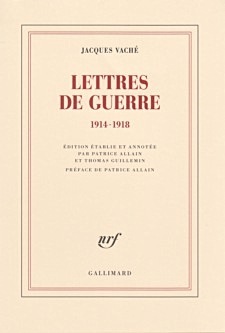 Du premier Manifeste à ses derniers Entretiens, André Breton aura toujours célébré celui qu’il appelait «l’homme que j’ai le plus aimé au monde».
Du premier Manifeste à ses derniers Entretiens, André Breton aura toujours célébré celui qu’il appelait «l’homme que j’ai le plus aimé au monde».
Et quinze Lettres de guerre, envoyées depuis le front à son ami poète ainsi qu’à Théodore Fraenkel et Louis Aragon, auront suffi pour que Vaché devienne l’arme secrète de plusieurs générations.
Breton révélait en 1919 son «Umour» sans H, surgi au milieu des combats, l’expression poétique la plus pure de l’humour noir et de la «désertion intérieure».
Présenter pour la première fois l’intégralité des lettres écrites par Jacques Vaché à sa famille et à ses amis pendant la guerre (158 dont 23 totalement inédites) permet de marquer le point de départ d’une aventure moderne et de mettre en lumière le soldat en action, la vocation prometteuse du dessinateur et la singularité du «dandy des tranchées».
Jacques Vaché:
Lettres de guerre (1914-1918)
Édition de Patrice Allain et Thomas Guillemin.
Préface de Patrice Allain
Collection Blanche, Gallimard
Parution: 08-11-2018
480 pages,
ill.,
140 x 205 mm
Achevé d’imprimer: 01-10-2018
Genre : Correspondances
Prix: 24,00 €
# new books
Jacques Vaché:
Lettres de guerre (1914-1918)
fleursdumal.nl magazine
More in: #Biography Archives, *War Poetry Archive, - Book News, - Bookstores, Archive U-V, Archive U-V, Art & Literature News, Jacques Vaché, Opium-Eaters, Vaché, Jacques
An indispensable anthology of brilliant hard-to-find writings by Poe on poetry, the imagination, humor, and the sublime which adds a new dimension to his stature as a speculative thinker and philosopher. Essays (in translation) by Charles Baudelaire, Stéphane Mallarmé, Paul Valéry, & André Breton shed light on Poe’s relevance within European literary tradition.
These are the arcana of Edgar Allan Poe: writings on wit, humor, dreams, drunkenness, genius, madness, and apocalypse. Here is the mind of Poe at its most colorful, its most incisive, and its most exceptional.
 Edgar Allan Poe’s dark, melodic poems and tales of terror and detection are known to readers everywhere, but few are familiar with his cogent literary criticism, or his speculative thinking in science, psychology or philosophy. This book is an attempt to present his lesser known, out of print, or hard to find writings in a single volume, with emphasis on the theoretical and esoteric. The second part, “The Friend View,” includes seminal essays by Poe’s famous admirers in France, clarifying his international literary importance.
Edgar Allan Poe’s dark, melodic poems and tales of terror and detection are known to readers everywhere, but few are familiar with his cogent literary criticism, or his speculative thinking in science, psychology or philosophy. This book is an attempt to present his lesser known, out of print, or hard to find writings in a single volume, with emphasis on the theoretical and esoteric. The second part, “The Friend View,” includes seminal essays by Poe’s famous admirers in France, clarifying his international literary importance.
America has never seen such a personage as Edgar Allan Poe. He is a figure who appears once an epoch, before passing into myth. American critics from Henry James to T. S. Eliot have disparaged and attempted to explain away his influence to no end, save to perpetuate his fame. Even the disdainful Eliot once conceded, “and yet one cannot be sure that one’s own writing has not been influence by Poe.”
Edgar Allan Poe (1809-1849), born in Boston, Massachusetts, was an American poet, writer, editor, and literary critic. He is well known for his haunting poetry and mysterious short stories. Regarded as being a central figure of Romanticism, he is also considered the inventor of detective fiction and the growing science fiction genre. Some of his most famous works include poems such as The Raven, Annabel Lee, and A Dream Within a Dream; tales such as The Cask of Amontillado, The Masque of Red Death, and The Tell-Tale Heart.
Title: The Unknown Poe
Subtitle: An Anthology of Fugitive Writings
Author: Edgar Allan Poe
Edited by Raymond Foye
Publisher: City Lights Publishers
Format: Paperback
124 pages
1980
ISBN-10 0872861104
ISBN-13 9780872861107
List Price $11.95
# American writers
Edgar Allan Poe
fleursdumal.nl magazine
More in: - Book Lovers, - Book Stories, Archive O-P, Archive O-P, Art & Literature News, Edgar Allan Poe, Poe, Edgar Allan, Poe, Edgar Allan, Tales of Mystery & Imagination
Die Vielfalt von Rainer Maria Rilkes (1875 bis 1926) Lebensstationen spiegelt sich im Werk des “letzten Dichters” wider.
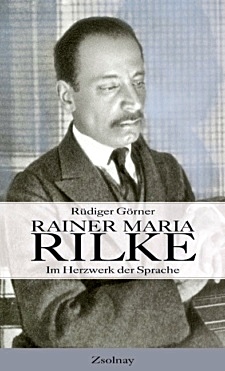 In dieser kompakten Darstellung folgt Rüdiger Görner Rilkes Spuren, verwehrt sich aber den gängigen Einordnungen und Periodisierungen. Es geht ihm vielmehr um den Prozess des Schaffens und um die Geschlossenheit des Werkes.
In dieser kompakten Darstellung folgt Rüdiger Görner Rilkes Spuren, verwehrt sich aber den gängigen Einordnungen und Periodisierungen. Es geht ihm vielmehr um den Prozess des Schaffens und um die Geschlossenheit des Werkes.
Görner zeigt Rilke in seiner Zeit und analysiert die wichtigsten Einflüsse. Auf behutsame Weise werden Leben und Werk miteinander verwoben, und Görner veranschaulicht die Wirkung der Musik, der bildenden Kunst und der Politik.
Rüdiger Görner, geboren 1957 in Rottweil, ist Professor für Neuere Deutsche und vergleichende Literatur an der Queen Mary University of London. Gründer des Ingeborg Bachmann Centre for Austrian Literature und Gründungsdirektor des Centre for Anglo-German Cultural Relations. Träger des Deutschen Sprachpreises, des Reimar Lüstpreises der Alexander von Humboldt-Stiftung und des Verdienstordens der Bundesrepublik Deutschland. Bei Zsolnay erschienen Rainer Maria Rilke. Im Herzwerk der Sprache (2004), Georg Trakl. Dichter im Jahrzehnt der Extreme (2014) und Oskar Kokoschka. Jahrhundertkünstler (2018).
Rüdiger Görner
Rainer Maria Rilke.
Im Herzwerk der Sprache
Buch – Fester Einband
344 Seiten
Deutscher Sprache
Zsolnay / Deuticke
Carl Hanser Verlag, München
ISBN 978-3-552-05302-1
2004
€24,90
# new books
Rainer Maria Rilke
fleursdumal.nl magazine
More in: - Book News, - Book Stories, Archive G-H, Archive Q-R, Art & Literature News, Rilke, Rainer Maria
Artaud, poète de la survie et de la sur-vie ?
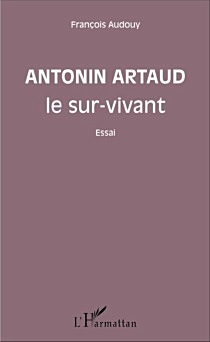 C’est l’angle d’approche de cet essai, qui revisite cet être hors-normes et haut en couleurs.
C’est l’angle d’approche de cet essai, qui revisite cet être hors-normes et haut en couleurs.
L’impatient patient Artaud se trouve ici confronté à ses foisonnantes références, religieuses et philosophiques, remis dans son contexte actuel, attaqué et fouillé au corps pour en extraire sa substantifique moelle : celle d’un nouveau-né éternel, d’un trompe-la-mort, d’un tueur de verbe. D’un sur-vivant.
Antonin Artaud, de son vrai nom Antoine Marie Joseph Artaud, est né à Marseille le 4 septembre 1896 et mort à Ivry-sur-Seine le 4 mars 1948. Poète, romancier, acteur, dessinateur, dramaturge et théoricien du théâtre. Dans son essai Le Théâtre et son double, Artaud invente le concept du “théâtre de la cruauté”
François Audouy
Antonin Artaud le sur-vivant.
Essai
Broché
Editions L’Harmattan Paris
Format : 13,5 x 21,5 cm
ISBN : 978-2-343-09048-1
2016
92 pages
€ 12,00
# new books
Antonin Artaud le sur-vivant
fleursdumal.nl magazine
More in: - Book Stories, Antonin Artaud, Archive A-B, Archive A-B, Artaud, Antonin, AUDIO, CINEMA, RADIO & TV, Psychiatric hospitals, THEATRE
A series of disruptive, unnerving sounds haunts the fictional writings of Franz Kafka.
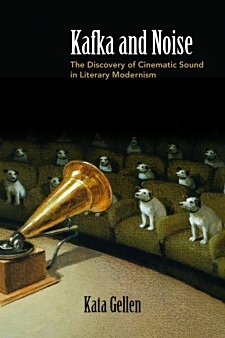 These include the painful squeak in Gregor Samsa’s voice, the indeterminate whistling of Josefine the singer, the relentless noise in “The Burrow,” and telephonic disturbances in The Castle.
These include the painful squeak in Gregor Samsa’s voice, the indeterminate whistling of Josefine the singer, the relentless noise in “The Burrow,” and telephonic disturbances in The Castle.
In Kafka and Noise, Kata Gellen applies concepts and vocabulary from film theory to Kafka’s works in order to account for these unsettling sounds. Rather than try to decode these noises, Gellen explores the complex role they play in Kafka’s larger project.
Kafka and Noise offers a method for pursuing intermedial research in the humanities—namely, via the productive “misapplication” of theoretical tools, which exposes the contours, conditions, and expressive possibilities of the media in question. This book will be of interest to scholars of modernism, literature, cinema, and sound, as well as to anyone wishing to explore how artistic and technological media shape our experience of the world and the possibilities for representing it.
Kata Gellen is an assistant professor in the Department of Germanic Languages and Literature at Duke University.
Kata Gellen (Author)
Kafka and Noise.
The Discovery of Cinematic Sound in Literary Modernism
272 pages
Northwestern University Press
Literary Criticism
Cloth Text – $99.95
ISBN 978-0-8101-3894-0
Paper Text – $34.95
ISBN 978-0-8101-3893-3
Publication Date: January 2019
# new books
The Discovery of Cinematic Sound in Literary Modernism
fleursdumal.nl magazine
More in: # Music Archive, #Archive A-Z Sound Poetry, #Archive Concrete & Visual Poetry, *Concrete + Visual Poetry K-O, - Book News, - Bookstores, Archive G-H, Archive K-L, Art & Literature News, Franz Kafka, Kafka, Franz, Kafka, Franz, Modernisme
Before the era of fake news and anti-fascists, William S. Burroughs wrote about preparing for revolution and confronting institutionalized power.
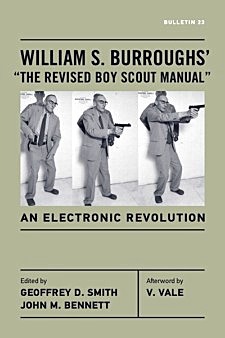 In this work, Burroughs’ parody becomes a set of rationales and instructions for destabilizing the state and overthrowing an oppressive and corrupt government. As with much of Burroughs’ work, it is hard to say if it is serious or purely satire. The work is funny, horrifying, and eerily prescient, especially concerning the use of language and social media to undermine institutions.
In this work, Burroughs’ parody becomes a set of rationales and instructions for destabilizing the state and overthrowing an oppressive and corrupt government. As with much of Burroughs’ work, it is hard to say if it is serious or purely satire. The work is funny, horrifying, and eerily prescient, especially concerning the use of language and social media to undermine institutions.
The Revised Boy Scout Manual was a work Burroughs revisited many times, but which has never before been published in its complete form.
Based primarily on recordings of a performance of the complete piece found in the archives at the OSU libraries, as well as various incomplete versions of the typescript found at Arizona State University and the New York Public Library archives, this lost masterpiece of satiric subversion is finally available in its entirety.
“He’s up there with the pope . . . you can’t revere him enough . . . he’s the greatest mind of our times.” — Patti Smith
“Well, he’s a writer.” —Samuel Beckett
“The Revised Boy Scout Manual offers easy-to-read proof that the uncensored human imagination allowed to freely extrapolate about future social change can offer outrageous scenarios and fresh language capable of inspiring readers decades into the future.” —V. Vale, founder and publisher of RE/Search
The Revised Boy Scout Manual
An Electronic Revolution
by William S. Burroughs
Edited by John M. Bennett, Geoffrey D. Smith
Publisher Ohio State University Press
Language: English
Format Paperback
Nb of pages: 144
ISBN-10 0814254896
ISBN-13 9780814254899
Publication 01 September 2018
$12.65
# new books
William S. Burroughs
The Revised Boy Scout Manual
fleursdumal.nl magazine
More in: #Beat Generation Archives, - Book News, Archive A-B, Art & Literature News, AUDIO, CINEMA, RADIO & TV, Burroughs, William S., Conceptual writing, Samuel Beckett, Smith, Patti
Tijger grijpt de punterstok om de boot uit het riet te houden. Grootvader Bernhard staat voor zijn molenhuis en zwaait hen na.
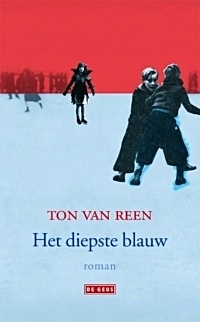 `Je zult zelf zien dat de Chinezen op hun handen lopen’, roept hij. `Ze eten met hun voeten.’
`Je zult zelf zien dat de Chinezen op hun handen lopen’, roept hij. `Ze eten met hun voeten.’
`Ik stuur u een kaart van het paleis van de keizer’, roept Mels.
Hij roeit. Hij roeit altijd. De taken zijn verdeeld. Tijger is stuurman en piloot.
Iemand moet de leiding hebben. Dat is altijd Tijger. Tijger die op de kracht van Mels vertrouwt. Mels is matroos en machinist tegelijk. Het roeien gaat hem makkelijk af. Hij hoeft zich nauwelijks in te spannen. Het water in de Wijer staat hoog en stroomt flink, alsof het haast heeft zich onder de brug door te wurmen en uit het dorp weg te komen. De boot gaat als vanzelf.
`Moet je zien hoeveel mensen ons uitzwaaien’, zegt Thija. `Het hele dorp is uitgelopen om afscheid te nemen.’
Ze zijn al bijna bij de brug. Opeens ziet hij Lizet, die haar tong uitsteekt tegen Thija. Haar been dat ze op de reling zet. De kanten strik rond haar dij. De slip die haar billen bijna bloot laat. Thija doet of ze het niet ziet.
Ze glijden onder de brug door. In de geheimzinnige grot onder de brug wordt opeens alles anders. De natte wanden glinsteren groen, om aan te kondigen dat er een wonder staat te gebeuren. In het schemerdonker veranderen hun stemmen en nemen alle dingen andere vormen aan. Als een dartel klein vliegtuig komt de boot onder de overkapping te voorschijn en vliegt omhoog. Een kleine pipercub op weg naar China, die opstijgend onophoudelijk van vorm en kleur verandert.
De mensen juichen. Mels ziet zijn moeder met haar beide handen wuiven, net of ze zelf ook mee wil. Hij zwaait terug.
`Ik breng zijden bloemen voor je mee’, roept hij naar zijn moeder. `En voor jou breng ik een … een …’ roept hij naar zijn vader, die hem in zijn deftigste zwart nawuift. `Een … een …’ probeert hij nog, maar hij weet niet wat hij voor zijn vader mee moet brengen, want ook als hij jarig is, weet hij nooit wat hij voor hem moet kopen.
`We gaan!’ schreeuwt Tijger enthousiast vanuit de cockpit. Hij heeft het nog maar net geroepen, of het vliegtuig klapt tegen de starre, dode muur van de graansilo. Meel stuift in het rond. Alles is wit. De zwaaiende mensen stuiven onder, maar ze blijven doorgaan met zwaaien, alsof ze niet hebben gezien dat het vliegtuig voor hun ogen uit elkaar is gespat. Ze blijven zwaaien tot het allemaal sneeuwpoppen zijn geworden, met zwarte hoeden en verkoolde ogen.
Ton van Reen: Het diepste blauw (081)
wordt vervolgd
fleursdumal.nl magazine
More in: - Book News, - Het diepste blauw, Archive Q-R, Reen, Ton van
For the last 2,500 years literature has been attacked, booed, and condemned, often for the wrong reasons and occasionally for very good ones. The Hatred of Literature examines the evolving idea of literature as seen through the eyes of its adversaries: philosophers, theologians, scientists, pedagogues, and even leaders of modern liberal democracies.
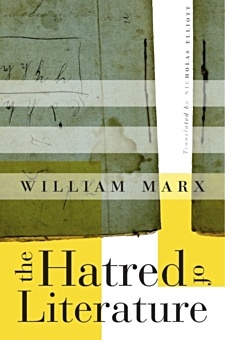 From Plato to C. P. Snow to Nicolas Sarkozy, literature’s haters have questioned the value of literature—its truthfulness, virtue, and usefulness—and have attempted to demonstrate its harmfulness.
From Plato to C. P. Snow to Nicolas Sarkozy, literature’s haters have questioned the value of literature—its truthfulness, virtue, and usefulness—and have attempted to demonstrate its harmfulness.
Literature does not start with Homer or Gilgamesh, William Marx says, but with Plato driving the poets out of the city, like God casting Adam and Eve out of Paradise. That is its genesis. From Plato the poets learned for the first time that they served not truth but merely the Muses. It is no mere coincidence that the love of wisdom (philosophia) coincided with the hatred of poetry. Literature was born of scandal, and scandal has defined it ever since.
In the long rhetorical war against literature, Marx identifies four indictments—in the name of authority, truth, morality, and society. This typology allows him to move in an associative way through the centuries. In describing the misplaced ambitions, corruptible powers, and abysmal failures of literature, anti-literary discourses make explicit what a given society came to expect from literature. In this way, anti-literature paradoxically asserts the validity of what it wishes to deny. The only threat to literature’s continued existence, Marx writes, is not hatred but indifference.
William Marx is Professor of Comparative Literature at the University of Paris Nanterre.
The Hatred of Literature
William Marx
Translated by Nicholas Elliott
Belknap Press
Harvard University Press
ISBN 9780674976122
Publ.: January 2018
Hardcover
240 pages
€27.00
# new books
William Marx – The Hatred of Literature
fleursdumal.nl magazine
More in: - Book News, - Book Stories, Archive M-N, Art & Literature News, MONTAIGNE, The Art of Reading, The talk of the town
Delphine Lecompte (1978) debuteerde in 2004 in het Engels met de roman Kittens in the Boiler, daarna schakelde ze over naar gedichten in haar moedertaal.
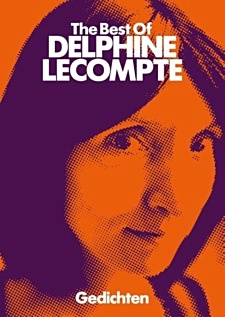 Voor haar debuutbundel De dieren in mij kreeg ze de C. Buddingh’-prijs 2010 en de Prijs Letterkunde 2011 van de Provincie West-Vlaanderen. Haar vorige bundel Dichter, bokser, koningsdochter werd genomineerd voor de VSB Poëzieprijs.
Voor haar debuutbundel De dieren in mij kreeg ze de C. Buddingh’-prijs 2010 en de Prijs Letterkunde 2011 van de Provincie West-Vlaanderen. Haar vorige bundel Dichter, bokser, koningsdochter werd genomineerd voor de VSB Poëzieprijs.
Het oeuvre van Delphine Lecompte vormt een ontembaar en onvoorspelbaar universum. In inmiddels zeven bundels bevraagt ze volstrekt genadeloos en vol branie zichzelf, de wereld en de poëzie.
Nu is het tijd voor een Best Of, waarin alle incestueuze imkers, gekwelde touwslagers, pedofiele tuinmannen, norse walvisjagers, morose windhondenfokkers, verwaarloosde hoefdieren, onbereikbare moeders en de geliefde oude kruisboogschutter een nieuw verband met elkaar aangaan. Ze bevolken een wereld die vol is van woede en gekte, maar ook van bezinning, verliefdheid en troost.
Best of Delphine Lecompte
Auteur: Delphine Lecompte
Taal: Nederlands
Poëzie
Uitgever: De Bezige Bij
Druk 1e druk
Omslagontwerp Moker Ontwerp
Foto auteur Koen Broos
Vormgeving binnenwerk Aard Bakker
Druk Bariet Ten Brink, Meppel
isbn 978 94 031 3720 9
nur 306
Afmetingen 24 x 17 x 1,2 cm
128 pagina’s
Paperback
November 2018
€ 19,99
# new books
Best of Delphine Lecompte
Poëzie
fleursdumal.nl magazine
More in: #Editors Choice Archiv, - Book News, - Bookstores, Archive K-L, Art & Literature News, Lecompte, Delphine
“Über Nacht war ich Winnetou!” ist für alle Filmfans ein wahrer Schatz: Drei Jahre nach dem Tod ihres Mannes Pierre Brice zeigt seine Frau Hella das über 50 Jahre lang behütete und zum Großteil unveröffentlichte private Fotomaterial des Winnetou-Schauspielers, entstanden am Rande der Dreharbeiten zu den Winnetou-Filmen.

Ergänzt werden diese Aufnahmen neben zahlreichen weiteren Fotos aus den Winnetou-Filmen unter anderem durch persönliche Briefe, Postkarten, Verträge und Vereinbarungen.
Persönliche Dokumente Pierre Brice’ runden diese einzigartige Sammlung von Memorabilia über einen der beliebtesten und populärsten Schauspieler der letzten 55 Jahre ab.
Pierre-Brice-Edition “Über Nacht war ich Winnetou!”
von Hella Brice
1960er Jahre – Dreharbeiten der Karl-May-Filme. ‘Pierre Brice-Edition’.
Fans von Pierre Brice, Karl May oder Filmen allgemein
Buch (gebunden)
223 Seiten
ISBN: 3780231018
EAN: 9783780231017
21, 4 cm / 30, 2 cm / 2, 0 cm ( B/H/T ).
Karl-May-Verlag
12. Oktober 2018
€ 39,00
# new books
Karl-May-Filme
Pierre Brice-Edition
fleursdumal.nl magazine
More in: - Book News, - Bookstores, Archive A-B, Archive M-N, Art & Literature News, AUDIO, CINEMA, RADIO & TV, Cowboys and Indians, Karl May
A writer who defies categorization, Daniil Kharms has come to be regarded as an essential artist of the modernist avant-garde.
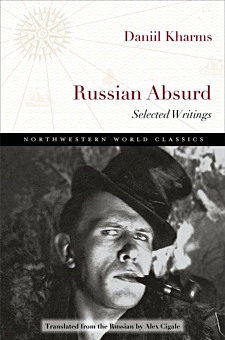 His writing, which partakes of performance, narrative, poetry, and visual elements, was largely suppressed during his lifetime, which ended in a psychiatric ward where he starved to death during the siege of Leningrad.
His writing, which partakes of performance, narrative, poetry, and visual elements, was largely suppressed during his lifetime, which ended in a psychiatric ward where he starved to death during the siege of Leningrad.
His work, which survived mostly in notebooks, can now be seen as one of the pillars of absurdist literature, most explicitly manifested in the 1920s and ’30s Soviet Union by the OBERIU group, which inherited the mantle of Russian futurism from such poets as Vladimir Mayakovsky and Velimir Khlebnikov.
This selection of prose and poetry provides the most comprehensive portrait of the writer in English translation to date, revealing the arc of his career and including a particularly generous selection of his later work.
DANIIL KHARMS (1905–1942) was a major figure in twentieth-century Russian and Soviet literature. An enigmatic and genre-bending artist, he was among the most significant voices in what came to be known as the literature of Russian absurdism.
ALEX CIGALE was awarded an NEA Literary Translation Fellowship in 2015. His translations from Russian and his original poetry in English have appeared in such journals as the New England Review, PEN America, TriQuarterly, and World Literature Today.
“…lively and funny… a profound and subtle testament to Kharms.” —Times Literary Supplement
Daniil Kharms:
Russian Absurd.
Selected Writings
Translated from the Russian by Alex Cigale
Northwestern World Classics
Poetry
February 2017
ISBN 978-0-8101-3457-7
280 pages
Trade Paper
$24.95
# new books
Russian Absurd
Selected Writings
Daniil Kharms;
Translated from the Russian by Alex Cigale
fleursdumal.nl magazine
More in: #Biography Archives, - Book News, Archive K-L, Archive K-L, Art & Literature News, Constructivism, Futurisme, Kharms (Charms), Daniil
Thank you for reading Fleurs du Mal - magazine for art & literature